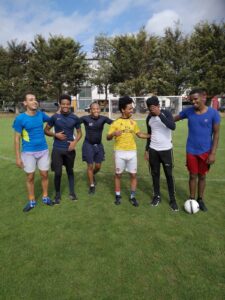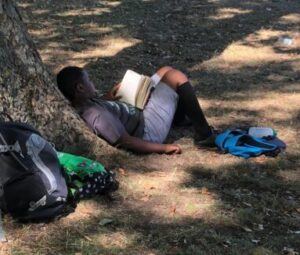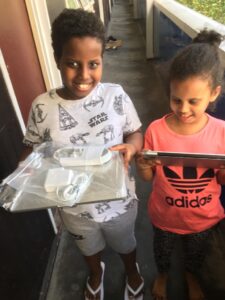One Year On: Our Homework & Activities Clubs
Our Homework & Activities Clubs (which are part of our Love to Learn education programme) have worked with refugee young people for more than 16 years. Here’s a round up of what we’ve achieved over the last year (2020/21).
The refugee young people we work with are substantially behind at every educational Key Stage, which can result in low attainment levels, challenging behaviour, risk of exclusion and restricted opportunities in life/employment. To enable them to thrive in education we run a number of Homework & Activity Clubs including: Junior Club (5-10 year olds), Senior Club (10-15s), GCSE Study Groups (15-16s), Youth Club (16-21) and Holiday Clubs (5-18s).
Over this year we supported 59 refugee young people and their families.
Life in Lockdown
Due to the ongoing lockdowns, we have been unable to run our usual face to face services. We’ve had to adapt our support accordingly.
During the first national lockdown we started a weekly Corona Homework Club, where we were supporting local children’s academic education, as well as their social and emotional wellbeing. They were energetic sessions which included the rock paper scissor championship, spot the difference, yoga, meditation, online Pictionary, craft challenges and Joe Wickes workouts.
When restrictions were partially lifted we had an amazing summer getting children out and about, seeing their friends, having fun and sharing their experiences of lockdown. In September 2020, we were able to run small face-to-face Homework Clubs with bubbles of 15 children. The Clubs were rotated so each child attended every two weeks.
During the second and third lockdowns we continued to provide online support. We now have five weekly online Clubs: GCSE Homework Club, Youth Club, Wednesday Corona club, Wednesday drop-in Homework Help Club and Thursday Music Group.
Due to staff changes, and then Coronavirus, our new Youth Club was initially delayed. In May 2020 we started the online Club. Young people work with our youth worker, ESOL and maths teacher and volunteers.

Outcome 1. Improved confidence in the children that attend the homework clubs
This past year we have had to adapt our way of working and support for our young people. Missing school, not seeing friends and being generally isolated, in often overcrowded housing, has had a big impact on the confidence of the children we support.
Due to the circumstances, a number of our children were particularly anxious and low in confidence, not wanting to leave their home or engage with friends and family. During our online sessions, we taught a range of coping tools to manage stress, anxiety and anger, and then talked about the things that are troubling them. We ran short weekly meditation, wellbeing and exercise activities. We found confidence grew with each session and they reported using the tools to manage everyday worries and low self-esteem. 63% of Club attendees display high levels of confidence – based on scoring themselves across 7 areas of daily life. And 78% display high levels of wellbeing – based on scoring themselves across 5 areas of daily life.
For the most vulnerable, Club staff have met regularly to review progress and develop individual support plans. If a child struggles with a particular issue, we provide 1:1 support so they can talk through the issues, reflect and try to develop their own solutions. Youth workers kept in weekly phone contact with those not engaging with the online sessions. This support allows us to build their confidence from their point of view of their individual needs and circumstances.
We work closely with parents. We regularly refer particular cases to our advice and advocacy team. This year our Project Manager has advocated for 6 families on issues such as exclusions, challenging behaviour and SEN. Club staff work closely with local support groups like Battersea Coronavirus Angels and Wandsworth Foodbank to provide families with emergency support. By supporting the whole family children’s home lives are more secure and lead to increased confidence at home.
In order to stay in touch with the children and support them to stay active and confident we:
- Called all young people on a weekly basis.
- Sent resource packs. Packs included resources to complete school work, games, jigsaws and craft resources.
- Worked with local artists to develop craft packs. So far over 300 art packs have been delivered.
- Ran weekly music workshops with a youth music charity, Fairbeats!.
- Shared weekly info-posters, with fun and educational resources, with over 100 families, and shared via social media and with other organisations.
- Enabled children to increase confidence, have fun, learn new skills and see friends.
Over summer 2020 we raised extra funds to provide a full holiday programme. This was especially important as the children were desperate to get outdoors, see their friends and have fun. We ran sports sessions, wellbeing workshops, family visits to the seaside, outdoor art classes and more, 4 days a week for 4 weeks. 106 children attended. 98% said they’d developed their social skills; 85% said their independence had increased; and 84% felt more resilient.
Outcome 2. Children’s improved relationships with adults and other young people
Over the past year 37 volunteers have supported our online Clubs and summer activities. They are from a variety of professional and cultural backgrounds including university students, teachers, retired social workers, scientists. They are role models. Children learn about the volunteer’s life experiences, what it is like to be at university and routes into further education. These relationships have really grown, with volunteers reporting how seeing the children every week has strengthened their bond and trust. 72% of children attending our Clubs have aspirations, and know what they want to do when they leave school. 66% of those with aspirations post school want to go into further education and have a clear plan of grades needed to fulfil their dreams.
These improved and trusting relationships with adults has meant children are regularly confiding in them. As a result we have been able to support with a variety of concerns such as mental health, being given a lot of responsibility in the home, neglect, spending significant unsupervised time on devices.
The online Clubs are a great opportunity to see their friends. During the first lockdown we played games as a group, Tik Tok dances, yoga, cooking and more. The children could see their friends and have fun, even though we couldn’t be physically together. They reported that Club gave them a safe space to talk about their feelings and experiences of lockdown. We have seen friendships develop and improve.
During the second and third lockdowns we found that the children’s social confidence had decreased. They also asked for more support with their school work. Therefore, we changed the structure of our weekly online clubs. Now we meet as a group and then the children are paired with a volunteer in a ‘virtual room’ to either work on a set task/game or their school work. Matching the children with the same volunteer each week has maintained and strengthened their relationships. We support the volunteers with these relationships, as well as providing educational and engaging resources.
All of the young people that join our Monday Youth Club are Unaccompanied Asylum Seeking Young People, living in the UK alone under the care of social services. Many that join the group are not in education or employment and as a result are extremely isolated. This has increased with the current situation. We have found that their confidence in relating to the volunteers and staff that attend the weekly online youth club has really increased. After the first session, in which they were very quiet, they now actively engaged in the sessions, ask questions and all reported they that they look forward to the group as they have someone to speak to. Staff and volunteers have also seen how the relationships have strengthened each week.
Volunteers are also working online, one to one with particularly vulnerable young people who find it hard to join the group sessions. The children return every week and report looking forward to seeing the adult.
Outcome 3. Children are willing to engage with reading and writing
The evidence we’ve gathered from our young people and their families during the pandemic shows they are experiencing a number of difficulties, especially the extra hardships that they have faced accessing and engaging with learning from home. The majority of the children we work with live in overcrowded housing, sharing beds with siblings and parents, which increases the challenges of lockdown. This lack of sleep, heightened tension and tight physical space, all adds to the strain on children and their parents, making it a difficult environment to learn in. Parents also reported being unable to help their children with school work due to feeling overwhelmed, not having the correct equipment/resources, not speaking English nor being literate themselves.
Our online Clubs have prioritised reading and writing support. We provide staff and volunteers with educational resources they can use to assist the children’s learning. Volunteers plan specific activities based around the children’s individual interests and support them with aspects they may be struggling with. Many children use the time to read out loud to an adult and write stories. As their confidence working online grew we saw that all the children brought their school work and a reading book to every session. We have seen an increase in willingness to engage with reading and writing by the majority of children that attend Clubs.
We also have two qualified teachers working in our Love to Learn team. They often attend our sessions to support volunteers and children with specific subjects. Last week, for example, a volunteer was struggling with a child’s fractions homework. Our colleague, Abdul, a teacher for over 30 years, joined their Zoom breakout room to work on the questions together. Due to regular attendance we have seen an increase in the children’s confidence with their reading and writing. They have said that they feel more confident knowing there will be someone there each week to go over anything they don’t understand or find difficult.
During a parent workshop, parents of children not in our homework clubs, talked about how they were struggling to support their 3 children with home schooling. As a result, we started a new weekly ‘drop in’ Club where children can bring a specific piece of work and get support with it from an adult. We’ve run this for 6 weeks and seen the same children come back every week, with new children also joining most weeks.
Our colleague, Ayla, is a secondary maths and ESOL teacher. With our youth worker, Josh, and 10 volunteers, she runs the online Youth Club. Each week she runs sessions on maths and English. These are very popular with all the young people. We have seen an increase in engagement and increased confidence in English and maths in all the young people that attend.
87% of young people who attended our Clubs said they engaged positively with learning whilst with us. 68% of those who positively engaged with learning at Club said they always engaged because they loved attending the sessions.
In addition to the above we have:

Given out 150+ laptops/tablets – Covid-19 has laid bare the true extent of digital exclusion amongst the families we work with. Over the past 11 months we have moved our support mostly online. We’ve secured 156 laptops for refugee children to access their education online (thanks in part to CiN Booster Fund). This runs alongside KLS’ laptop lending library of 55 laptops. We’re also teaching digital skills and how to be safe online. More devices and data are needed. We will secure these for our young people over the next few months.
Run regular parent workshops online – our colleagues have been supporting parents by running a number of online workshops, on a range of subjects all requested by parents. These include parenting in lockdown, supporting with online learning both primary and secondary, online safety and the Covid vaccine. All the workshops were run by local professionals in their field including NHS staff, parenting experts and primary and secondary teachers.
During the summer we also ran outdoor workshops looking at the Black Lives Matter movement and the murder of George Floyd; as well as their general health and wellbeing. These gave the young people a space to discuss the issues and their feelings around them.
Contact
If you’d like to contact our Homework Clubs please contact Nadine on 020 7585 0339 and email [email protected]